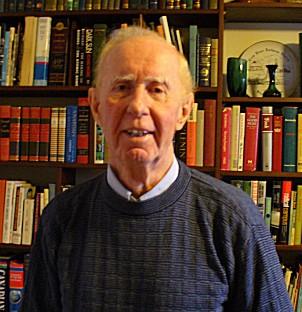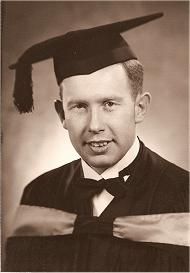 |
| |
It is with profound sadness that we announce the passing of Ian Thorson (February 22, 1934 - January 26, 2010).
Ian's TRIUMF career spanned thirty years, where his reactor expertise from Atomic Energy of Canada Limited in Chalk River proved an asset in designing the thermal neutron facility. Former TRIUMF Director, colleague, and long-time friend of Ian, Erich Vogt said, "I had worked with Ian at Chalk River until 1965 and knew him well. We needed someone who was an expert on neutron shielding, which was Ian's specialty. Therefore I suggested Ian to Tony Arrott who had just been recruited to work at SFU on using neutrons for the study of magnetic materials. Tony immediately made a trip to Chalk River and became very enthusiastic about recruiting. I had known Thorson well at Chalk River but it was Arrott who visited Chalk River and recruited Thorson for TRIUMF."
Ewart Blackmore, senior research scientist at TRIUMF, began working at TRIUMF at the same time as Ian, 40 years back, in September of 1969. "Ian was the expert on shielding and we learned very quickly that he was always right, possibly a bit conservative, but when he said that a beam line had to be shielded in a certain way, we followed his instructions."
Ian's first main responsibility for SFU at TRIUMF was to design the TRIUMF neutron facility. This is where the intense proton beam from the cyclotron stopped, generating neutrons that were moderated and delivered out through a slot in the shielding. In 1999, Ewart decided to learn more about this design to see if higher energy neutrons would be present, and together, they found a very useful beam that is now in demand by electronics companies for checking their electronics for errors due to natural background radiation in airplanes and in ground level communication systems. 40 years later, Ian's first design job at TRIUMF is still useful.
John D'Auria, professor at SFU and TRIUMF scientist commented, "Ian was a true colleague, a friend, and unquestionably one of the few worlds' experts on radiation physics, shielding, neutron interactions, nuclear reactions, etc. Without his expertise with the proper shielding needed at TRIUMF, TRIUMF would not have been a success. Ian will be missed both for his friendship, his guidance on difficult nuclear issues, and his expertise."
"But he was more than a shielding expert; he was concerned about safety and about people. He knew how to ask the right questions and had a deep understanding of the many issues" added Ewart. "Ian looked after people as well. He was always a fair and well-respected people manager. I met a lady the other day who had been asked by Ian to retire early during one of TRIUMF's funding crises. She said Ian was so nice about it and 'I felt sorry for Ian having to tell me'."
Ian went on to play a leading role in addressing safety issues at the laboratory and specifying the radiation shielding requirements for the new beam lines. As the laboratory matured, Ian continued to play a significant role in Health and Safety, putting his considerable intellect and personable manner into chairing the TRIUMF Safety Advisory Committee and taking on a senior management role as head of the Administration Division reporting to the Director. In his retirement, Ian continued to consult and share his expertise with his colleagues at TRIUMF and in several other countries.
Ewart Blackmore and John Drozdoff, a senior engineer in the TRIUMF safety group, shared a few smiles while reminiscing about Ian's writing and speaking style. At the service to celebrate Ian's life, Ewart shared "Ian wanted to make sure that whatever he wrote was correct, not necessarily clear to the reader, but correct. He used two words when one would do, usually words of three syllables, his sentences were typically very long, a little convoluted, with many caveats and clarifications and had to be read several times to really understand them. However they were always grammatically correct and technically correct. It was a joy to read Ian's reports especially concerning safety matters".
 |
Ian grew up on a farm outside Macoun in southern Saskatchewan. He received a Bachelor Degree in Engineering Physics in 1956, followed by a Master of Science Degree in Nuclear Physics in 1957 from the University of Saskatchewan. He then moved east to Deep River, Ontario, where he was employed by Atomic Energy of Canada in Chalk River, and served as a town councillor.It was there Ian married his wife Joyce and had three children together, Chris, Kim and Carol.
Erich Vogt said, "when Ian first came to Chalk River in 1959, he appeared to be an unreconstructed Viking, tall with red hair. However, he was a Viking with a difference - he loved books and learning, rather than the predatory pursuits normally associated with Vikings. He moved into the Deep River staff hotel which housed most of Chalk River's single staff and which was a rather unusual market for marriage. All of the professionals at Chalk River were male and when a new woman arrived in the hotel, to serve as a teacher or nurse for the town, she was captured into marriage right away, with a half-life of being single of only a few months! At the time, physicists were still considered as good marriage prospects and Ian succeeded in capturing Joyce into marriage very quickly. The marriage was very successful." In the fall of 1969, the young family of five packed up and moved to Vancouver. Ian was employed with Simon Fraser University (SFU), designing and working at the TRIUMF particle accelerator at UBC.
Ian retired in 1999, and enjoyed spending time with family at their cozy Heffley Lake cabin. He continued his lifelong love of music, including operas and singing with the Vancouver Orpheus Choir, which brought him much happiness. Last week in Burnaby, the choir played a prominent role in the service celebrating Ian's life.
Ian and Joyce enjoyed travelling, especially visiting grandchildren overseas and exploring his Scandinavian heritage with family. Ian's love of reading, which inevitably led to discussions of substantive science and other global topics, continued to shine. During his later years, Ian served as a Board member for the PLAN support organization. His mind was keen to the end and in true scientific spirit, Ian donated his mortal self to the UBC medical department.
We will all miss Ian, his ready smile and chuckle, and our thoughts go out to his family and friends for his sudden loss to all of us.
-- Melissa M. Baluk, Communications Assistant, with comments and additions from Ewart Blackmore, John D'Auria, Erich Vogt, Peter Jackson, Anne Trudel and the obituary.
